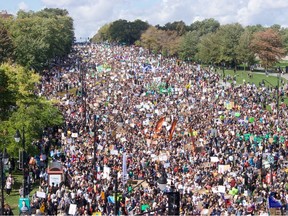The events will denounce the inaction of governments, five years after 500,000 people marched alongside Greta Thunberg in Montreal.

Article content
Climate marches will be held in nearly two dozen Quebec cities on Friday, exactly five years after 500,000 people marched alongside activist Greta Thunberg in Montreal.
Under the collective Pour la suite du monde, about 50 groups from various sectors are calling on Quebecers to attend a march near them to denounce inaction by the provincial government on the climate crisis — and demand that it do more.
Advertisement 2
Story continues below
Article content
“I think it’s a good moment to restate the ambition that is felt throughout communities in Quebec about wanting to do more and needing this issue to be taken seriously by all governments,” said Béatrice Alain, a spokesperson for the collective and the executive director of the Chantier de l’économie sociale. “There’s a broad understanding that the environmental issue is an existential one that affects us all and … we need to do better.”
In a press release encouraging Quebecers to protest, the collective explained that when it first launched in May, it requested a meeting with the Quebec government to discuss “concrete actions in favour of a real social and environmental transition.” It says that call remains unanswered to this day.
That’s why in addition to demanding more be done in response to the climate crisis, Friday’s marches also aim to highlight that civil society needs to be consulted about solutions.
“We know that there’s a consensus, that these issues need to be addressed, and they’re not,” Alain said. “So that’s one way that we’re not really listening to civil society. But also, civil society is not around the table when we’re discussing some of these issues and how we can contribute our alternative visions.”
Article content
Advertisement 3
Story continues below
Article content
Solutions are beyond the scope of just one government, Alain said: Different levels need to be working together and consulting groups invested in the issue.
Marie Maltais, a CEGEP student representing the youth sector for the collective, said Quebec must act as soon as possible for both future generations and current youth, who increasingly feel the climate crisis is their burden to carry.
“It’s not just what’s going to happen in 200 years, it’s what will happen in 50 years,” she said. “It’s imperative that older generations remove this burden from youth so that young people don’t have to experience this stress and anxiety at a lower and lower age.”
Maltais said even late-elementary school-age children are feeling stress and frustration.
“These young people should be able to experience their childhoods, and youth in high school, CEGEP and university should not have all this responsibility — they should have the impression of having a viable future,” she said.
Friday’s protests come on the heels of a summer of extreme weather in Montreal, including heat waves, heavy rains and flooding. It was the rainiest season ever recorded in the city. A year earlier, Montrealers experienced several days of poor air quality caused by wildfires in northern parts of the province. The city even had the worst air quality in the world on one of those days.
Advertisement 4
Story continues below
Article content
“I think every year now, we’re seeing new crises,” Alain said. “Every time there’s an episode like that, it underscores that the situation is changing quick that we need to be thinking about resiliency.”
Montreal’s march will depart from the Monument to George-Étienne Cartier on Parc Ave. at 6 p.m. and end at the Bonaventure métro station at 8 p.m. A “festive nighttime protest,” it promises a family atmosphere with music. Participants are asked to bring lighting.
It’s unclear what the turnout will be like, Alain said. About 2,200 people have expressed interest in the event on Facebook so far.
“The purpose is not to have one big show of strength in Montreal, it’s to show that there are actors all over, throughout all different regions in Quebec,” she said.
Other cities participating at various times on Friday include: Salaberry-de-Valleyfield, St-Jérôme, St-Hyacinthe, Quebec, Joliette, Sherbrooke, Gaspé, Rimouski, Baie-Comeau, Rouyn-Nouranda, Lebel-sur-Quévillon, Saguenay, Drummondville, Victoriaville, Nicolet and Shawinigan.
The marches will unfold a little differently in each region, all of which have their own realities, Alain explained.
“In Quebec City, they’re going to finish in front of political institutions,” she said. “In Baie-Comeau — in places where there are resource regions — people are also mobilizing and, obviously, those issues are felt very differently than in Montreal.
“I think the strength and the diversity and the representation that we’re going to see throughout Quebec is really, really interesting and important in terms of signalling how much of a priority this is and how people care enough to go out and speak on it throughout Quebec in different ways.”
Maltais is calling on Quebecers to show up to the march closest to them.
“It’s about our future for youth,” she said. “But if we’re older, it’s the future of our children, it’s the future of our grandchildren. It’s about fighting Pour la suite du monde.”
Recommended from Editorial
Advertisement 5
Story continues below
Article content
Article content



Comments